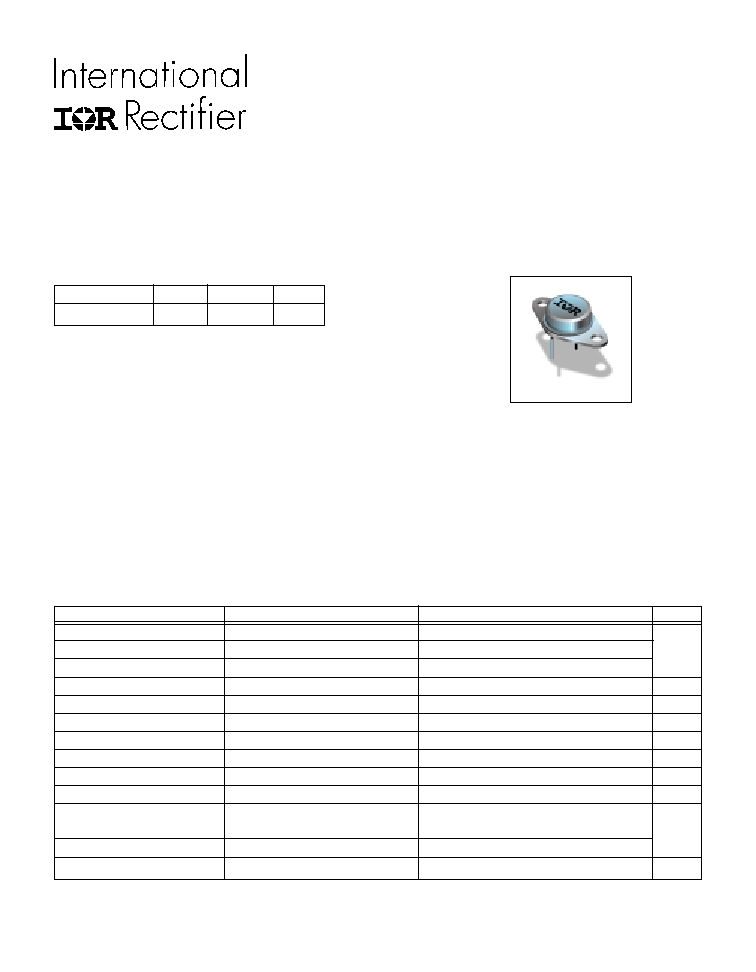
Absolute Maximum Ratings
Parameter
Units
ID @ VGS = 10V, TC = 25∞C
Continuous Drain Current
5.5
ID @ VGS = 10V, TC = 100∞C
Continuous Drain Current
3.5
IDM
Pulsed Drain Current
2 2
PD @ TC = 25∞C
Max. Power Dissipation
7 5
W
Linear Derating Factor
0.60
W/∞C
VGS
Gate-to-Source Voltage
±20
V
EAS
Single Pulse Avalanche Energy
1.7
mJ
IAR
Avalanche Current
5.5
A
EAR
Repetitive Avalanche Energy
--
mJ
dv/dt
Peak Diode Recovery dv/dt
4.0
V/ns
T J
Operating Junction
-55 to 150
TSTG
Storage Temperature Range
Lead Temperature
300 (0.063 in. (1.6mm) from case for 10s)
Weight
11.5 (typical)
g
PD - 90335F
o
C
A
01/22/01
www.irf.com
1
Product Summary
Part Number B
VDSS
R
DS(on)
I
D
IRF330 400V 1.00
5.5A
For footnotes refer to the last page
REPETITIVE AVALANCHE AND dv/dt RATED
JANTX2N6760
HEXFET
TRANSISTORS
JANTXV2N6760
THRU-HOLE (TO-204AA/AE)
[REF:MIL-PRF-19500/542]
IRF330
400V, N-CHANNEL
The HEXFET
technology is the key to International
Rectifier's advanced line of power MOSFET transistors.
The efficient geometry and unique processing of this latest
"State of the Art" design achieves: very low on-state resis-
tance combined with high transconductance; superior re-
verse energy and diode recovery dv/dt capability.
The HEXFET transistors also feature all of the well estab-
lished advantages of MOSFETs such as voltage control,
very fast switching, ease of paralleling and temperature
stability of the electrical parameters.
They are well suited for applications such as switching
power supplies, motor controls, inverters, choppers, audio
amplifiers and high energy pulse circuits.
TO-3
Features:
n
Repetitive Avalanche Ratings
n
Dynamic dv/dt Rating
n
Hermetically Sealed
n
Simple Drive Requirements
n
Ease of Paralleling
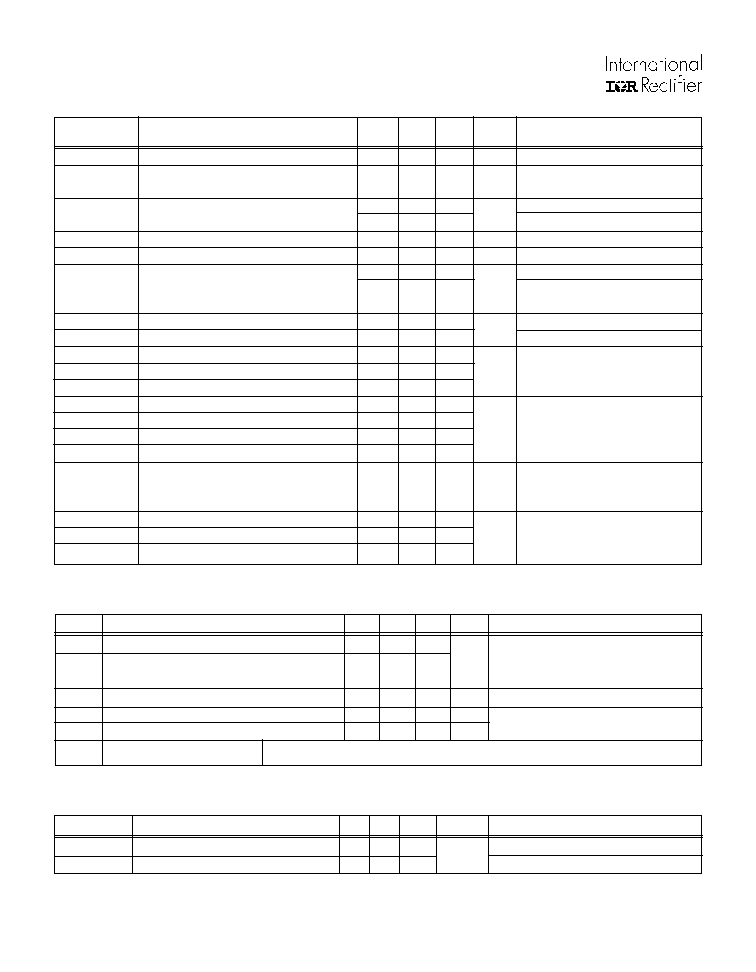
IRF330
2
www.irf.com
Thermal Resistance
Parameter
Min Typ Max
Units
Test Conditions
RthJC
Junction to Case
--
--
1.67
RthJA
Junction to Ambient
--
-- 30
Typical socket mount
∞C/W
Source-Drain Diode Ratings and Characteristics
Parameter
Min Typ
Max Units
Test Conditions
IS
Continuous Source Current (Body Diode)
--
--
5.5
ISM
Pulse Source Current (Body Diode)
--
--
2 2
VSD
Diode Forward Voltage
--
--
1.4
V
T
j
= 25∞C, IS =5.5A, VGS = 0V
trr
Reverse Recovery Time
--
--
700
nS
Tj = 25∞C, IF = 5.5A, di/dt
100A/
µ
s
QRR
Reverse Recovery Charge
--
--
6.2
µc
VDD
50V
t o n
Forward Turn-On Time
Intrinsic turn-on time is negligible. Turn-on speed is substantially controlled by LS + LD.
A
For footnotes refer to the last page
Electrical Characteristics
@ Tj = 25∞C (Unless Otherwise Specified)
Parameter
Min
Typ
Max Units
Test Conditions
BVDSS
Drain-to-Source Breakdown Voltage
4 00
--
--
V
VGS = 0V, ID = 1.0mA
BVDSS/
TJ
Temperature Coefficient of Breakdown
--
0.46
--
V/∞C
Reference to 25∞C, ID = 1.0mA
Voltage
RDS(on)
Static Drain-to-Source On-State
--
-- 1.00 VGS = 10V, ID =3.5A
Resistance
--
-- 1.22
VGS =10V, ID =5.5A
VGS(th)
Gate Threshold Voltage
2.0
-- 4.0 V VDS = VGS, ID =250µA
gfs
Forward Transconductance
2.9
--
--
S (
)
VDS > 15V, IDS =3.5A
IDSS
Zero Gate Voltage Drain Current
--
--
2 5
VDS=320V, VGS=0V
--
--
2 5 0
VDS =320V
VGS = 0V, TJ = 125∞C
IGSS
Gate-to-Source Leakage Forward
--
--
100
VGS =20V
IGSS
Gate-to-Source Leakage Reverse
--
--
-100
VGS =-20V
Qg
Total Gate Charge
1 7
--
3 9
VGS =10V, ID=5.5A
Qgs
Gate-to-Source Charge
2.0
--
6.0
nC
VDS =200V
Qgd
Gate-to-Drain (`Miller') Charge
8.0
--
2 0
td
(on)
Turn-On Delay Time
--
--
3 0
VDD =200V, ID =5.5A,
t r
Rise Time
--
--
4 0
RG =7.5
td
(off)
Turn-Off Delay Time
--
--
8 0
tf
Fall Time
--
--
3 5
LS + LD
Total Inductance
--
6.1
--
Ciss
Input Capacitance
--
620
VGS = 0V, VDS =25V
Coss
Output Capacitance
--
200
--
pF
f = 1.0MHz
Crss
Reverse Transfer Capacitance
--
7 5
--
nA
nH
n s
µ
A
Measured from the center of
drain pad to center of source
p a d
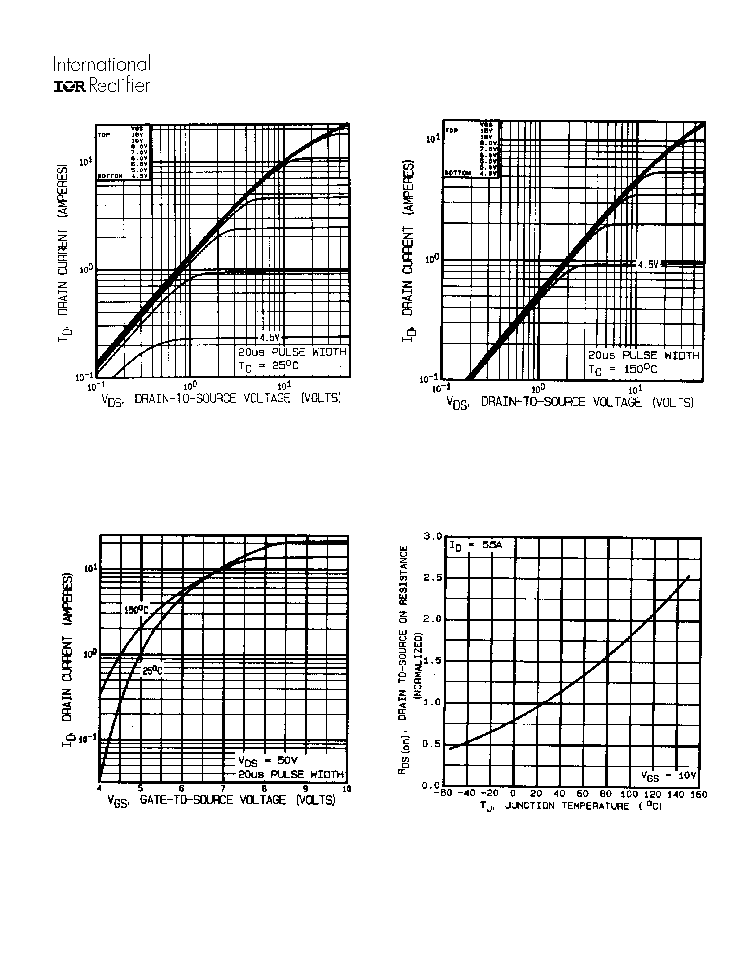
www.irf.com
3
IRF330
Fig 4. Normalized On-Resistance
Vs. Temperature
Fig 2. Typical Output Characteristics
Fig 1. Typical Output Characteristics
Fig 3. Typical Transfer Characteristics
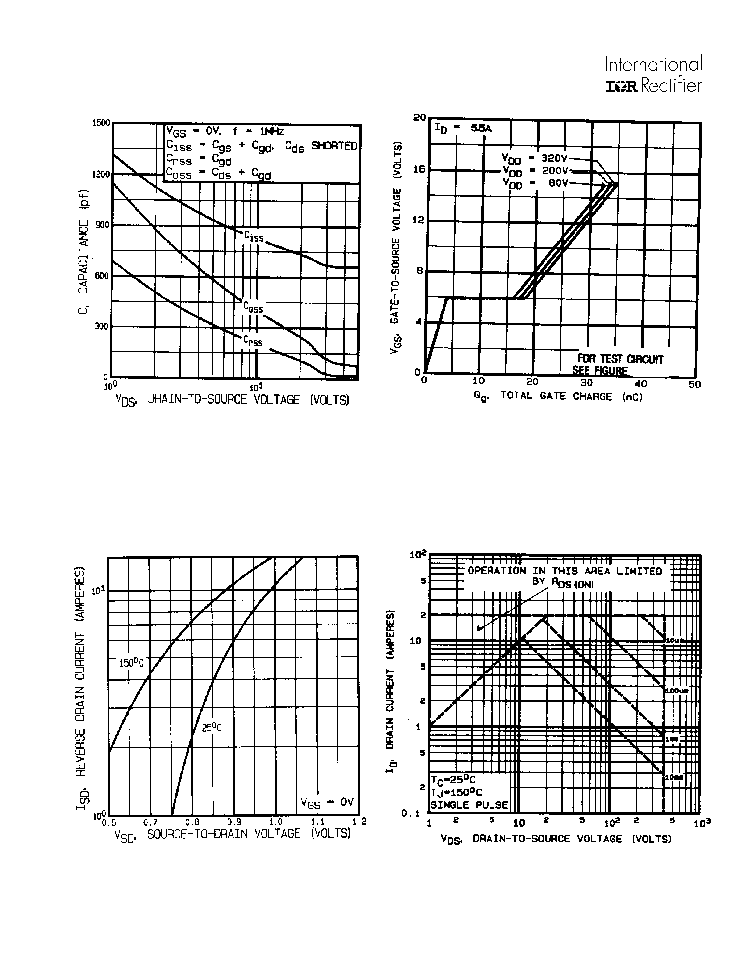
IRF330
4
www.irf.com
Fig 8. Maximum Safe Operating Area
Fig 6. Typical Gate Charge Vs.
Gate-to-Source Voltage
Fig 5. Typical Capacitance Vs.
Drain-to-Source Voltage
Fig 7. Typical Source-Drain Diode
Forward Voltage
13 a& b
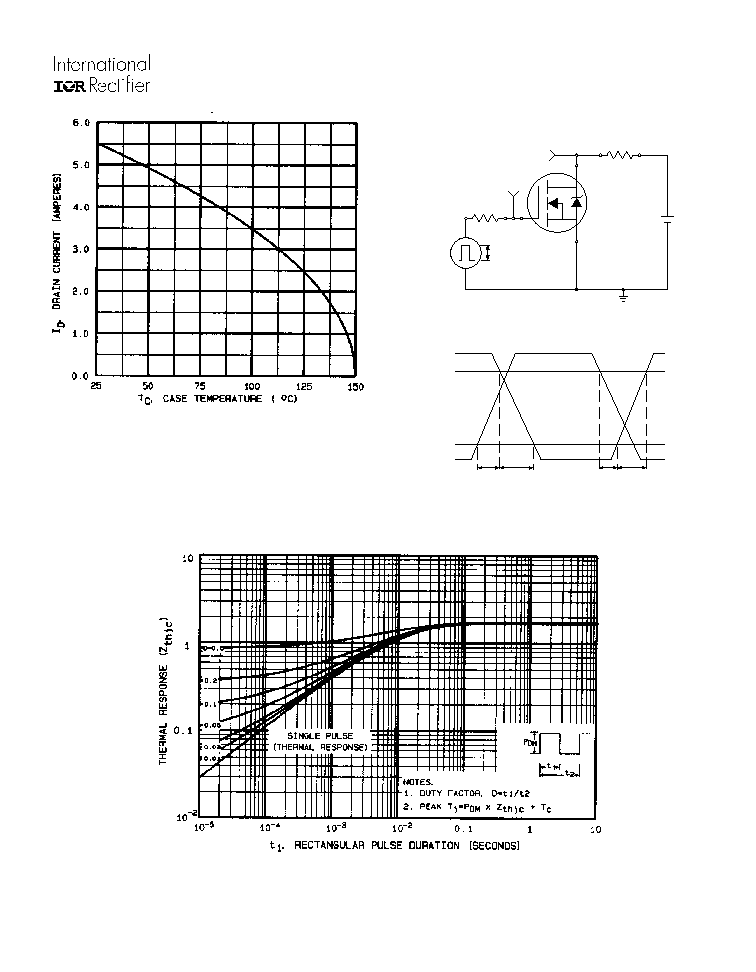
www.irf.com
5
IRF330
Fig 10a. Switching Time Test Circuit
V
DS
90%
10%
V
GS
t
d(on)
t
r
t
d(off)
t
f
Fig 10b. Switching Time Waveforms
V
DS
Pulse Width
1
µs
Duty Factor
0.1 %
R
D
V
GS
R
G
D.U.T.
10V
+
-
V
DD
Fig 11. Maximum Effective Transient Thermal Impedance, Junction-to-Case
Fig 9. Maximum Drain Current Vs.
Case Temperature




